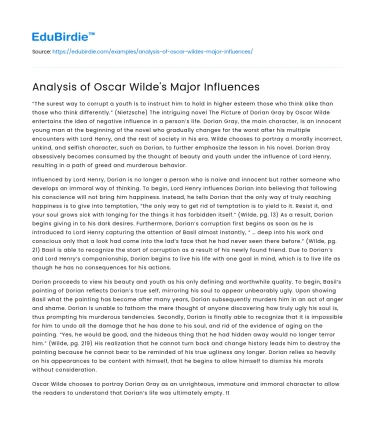“The surest way to corrupt a youth is to instruct him to hold in higher esteem those who think alike than those who think differently.” (Nietzsche) The intriguing novel The Picture of Dorian Gray by Oscar Wilde entertains the idea of negative influence in a person’s life. Dorian Gray, the main character, is an innocent young man at the beginning of the novel who gradually changes for the worst after his multiple encounters with Lord Henry, and the rest of society in his era. Wilde chooses to portray a morally incorrect, unkind, and selfish character, such as Dorian, to further emphasize the lesson in his novel. Dorian Gray obsessively becomes consumed by the thought of beauty and youth under the influence of Lord Henry, resulting in a path of greed and murderous behavior.
Influenced by Lord Henry, Dorian is no longer a person who is naive and innocent but rather someone who develops an immoral way of thinking. To begin, Lord Henry influences Dorian into believing that following his conscience will not bring him happiness. Instead, he tells Dorian that the only way of truly reaching happiness is to give into temptation, “the only way to get rid of temptation is to yield to it. Resist it, and your soul grows sick with longing for the things it has forbidden itself.” (Wilde, pg. 13) As a result, Dorian begins giving in to his dark desires. Furthermore, Dorian’s corruption first begins as soon as he is introduced to Lord Henry capturing the attention of Basil almost instantly, “ … deep into his work and conscious only that a look had come into the lad’s face that he had never seen there before.” (Wilde, pg. 21) Basil is able to recognize the start of corruption as a result of his newly found friend. Due to Dorian’s and Lord Henry’s companionship, Dorian begins to live his life with one goal in mind, which is to live life as though he has no consequences for his actions.
Save your time!
We can take care of your essay
- Proper editing and formatting
- Free revision, title page, and bibliography
- Flexible prices and money-back guarantee
Dorian proceeds to view his beauty and youth as his only defining and worthwhile quality. To begin, Basil’s painting of Dorian reflects Dorian’s true self, mirroring his soul to appear unbearably ugly. Upon showing Basil what the painting has become after many years, Dorian subsequently murders him in an act of anger and shame. Dorian is unable to fathom the mere thought of anyone discovering how truly ugly his soul is, thus prompting his murderous tendencies. Secondly, Dorian is finally able to recognize that it is impossible for him to undo all the damage that he has done to his soul, and rid of the evidence of aging on the painting. “Yes, he would be good, and the hideous thing that he had hidden away would no longer terror him.” (Wilde, pg. 219) His realization that he cannot turn back and change history leads him to destroy the painting because he cannot bear to be reminded of his true ugliness any longer. Dorian relies so heavily on his appearances to be content with himself, that he begins to allow himself to dismiss his morals without consideration.
Oscar Wilde chooses to portray Dorian Gray as an unrighteous, immature and immoral character to allow the readers to understand that Dorian’s life was ultimately empty. It emphasizes the point that because Dorian was an awful person, dying a rather pitiful death. To start, Dorian followed a path of extreme murderous behavior. He drove Sybil to kill herself through his insensitivity, murdered Basil after showing him the atrocious painting of himself, drove Alan Campbell to suicide, and lastly, killed himself. Dorian does not recognize his actions to be as impacting as he should. He recognizes he should correct himself for all the wrongs he has done however, decides to do so in an act of greed. He chooses not to seduce a girl in hopes it would correct his ugly soul. His ignorance further proves how immature and naive Dorian is as he thought that was all he would have to do to make things right. Wilde chooses to make Dorian a character with all the misfortunate qualities to send a message to his readers.
Dorian becomes a victim of aestheticism, taking him down a path that changes him for the worst and creating an insensitive, greedy monster who murders. Through Dorian, Wilde portrays how a powerful influence and guilt impact a person’s life. Ultimately, Dorian was an immature character who could not think for himself but instead went along with what those around him thought. A person must be aware of their surroundings and not be easily influenced so they do not make a change for the worst.






 Stuck on your essay?
Stuck on your essay?

